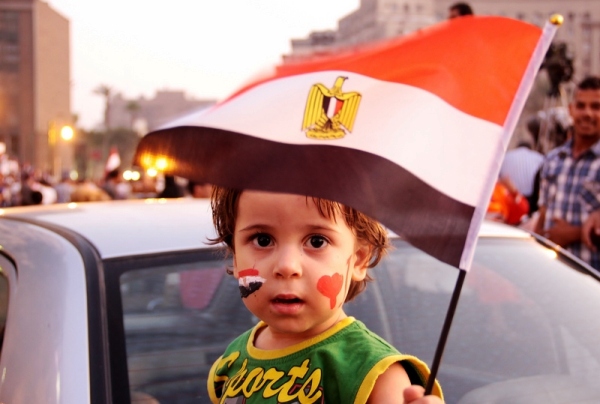Just as rights groups and press freedom advocates were thinking things could not get any worse for journalists in Egypt, a video that aired on an Egyptian private TV channel showing the arrest of Al Jazeera journalists Peter Greste and Mohamed Fahmy, proved them wrong.
The footage shown on the channel “Tahrir” on Sunday night was far less dramatic than the background music to which it was set –the kind of ominous-sounding soundtrack used to create suspense in intense mystery movies. It featured lingering shots of recording equipment including cameras, microphones, electronic cables, laptop computers and mobile phones used by the journalists in their work prior to their arrest. It also showed a perplexed-looking Fahmy being interrogated during the raid on his Cairo hotel room . Meanwhile, a caption at the bottom of the screen read ” exclusive footage of the Marriot cell accused of fabricating news on Al Jazeera.”
The interrogator who did not appear in the video but could only be heard, asked Fahmy about the type of work they were doing , why they were working out of a hotel room and how they get paid by the network. Asked if he had valid press credentials, Fahmy replied that his accreditation card had expired sometime ago. He added that he had applied for new credentials and was waiting to hear back from authorities.
The airing of the video drew fierce condemnation from Al Jazeera –the Qatari-funded network targeted by Egyptian authorities who accuse it of “inciting violence” and of being ” a mouthpiece for the Muslim Brotherhood”. In the first-of-its-kind prosecution in Egypt, 20 Al Jazeera journalists have been charged with conspiring with terrorists and manipulating clips that tarnish Egypt’s image abroad by protraying the country as being on the brink of civil war. Al Jazeera has denied the allegations, insisting its journalists were only doing their job. Fahmy, Greste and producer Baher Mohamed , who are among the defendants in what has come to be known as the Al Jazeera case, had been in custody for five weeks before formal charges were brought against them on Saturday. Two cameramen working for the Al Jazeera Arabic service and Al Jazeera Mubasher are also behind bars . They were arrested last summer while covering the unrest that erupted after the country’s first democratically elected President Mohamed Morsi was toppled by military-backed protests. One of the two defendants– Cameraman Mohamed Badr– was acquitted earlier this week along with sixty one suspect-protesters after spending the last six months in jail.
In a statement published on its website, Al Jazeera said Sunday’s airing of the controversial video was “another attempt to demonise its journalists”, adding that “it could prejudice the trial.”
Rights groups meanwhile see the detention of the Al Jazeera journalists as part of a wider crackdown on freedom of expression in the country. Index on Censorship — along with partner organisations Article 19, the Committee to Protect Journalists and Reports Without Borders– condemned the Egyptian government’s attacks on media freedom and called for the release of the journalists. (Full statement: English | Arabic)
“What has happened with the Al Jazeera journalists is part of an overall attempt to repress freedom of expression,” said Salil Shetty, Secretary General of Amnesty International. In an interview with Al Jazeera, he urged the international community to keep up pressure on the Egyptian government to resolve the situation.
Egyptian and foreign journalists also joined the chorus of denunciations of the aired video, using social media networks to express their alarm and frustration.
“The video and detention of Fahmy and Greste make our jobs as journalists in Egypt all the more difficult, ” Egyptian Journalist Nadine Maroushi complained on Twitter. Some reiterated calls for Twitter-users to follow the “FreeFahmy” hashtag on Twitter in support of the Al Jazeera detainees. Others dismissed the video as “ridiculous,” joking about how the items found in the room –such as a copy of Lonely Planet Egypt (which presumably belongs to Greste)–were “the evidence that would likely incriminate the journalists. ”
“The cameras, laptops and flipped toilet seat are proof that the journalists’hotel room was a den of espionage,”was another tongue-in-cheek comment posted on the social media network. Using Fahmy’s Twitter account, his brother Sherif sent a bitter message on Monday saying ” In Egypt, you are guilty until proven innocent.”
Meanwhile , foreign journalists’ associations are planning protest marches on Tuesday outside Egyptian embassies in cities as far away as Nairobi to demand the release of the detained journalists. Egypt’s military-backed government has so far largely ignored the calls , turning a blind eye to a petition signed last month by journalists and editors from more than fifty- two news organizations . Media freedom advocates are hoping however ,that Cameraman Mohamed Badr’s acquittal may be a sign that the government was finally easing its heavy-handed crackdown on journalists. They also hope that the Egyptian authorities would keep their recently- made promise of “ensuring that foreign journalists work freely to cover the news in an objective and balanced manner.” The pledge was made in a statement released on January 30 by the State Information Service–the government body responsible for accrediting foreign journalists.
They say the onus is now on the government to show its commitment to implementing articles in the constitution guaranteeing freedom of expression and the press. Releasing Fahmy and the other detained Al Jazeera journalists would be a step in the right direction.
This article was posted on 4 February 2014 at indexoncensorship.org





